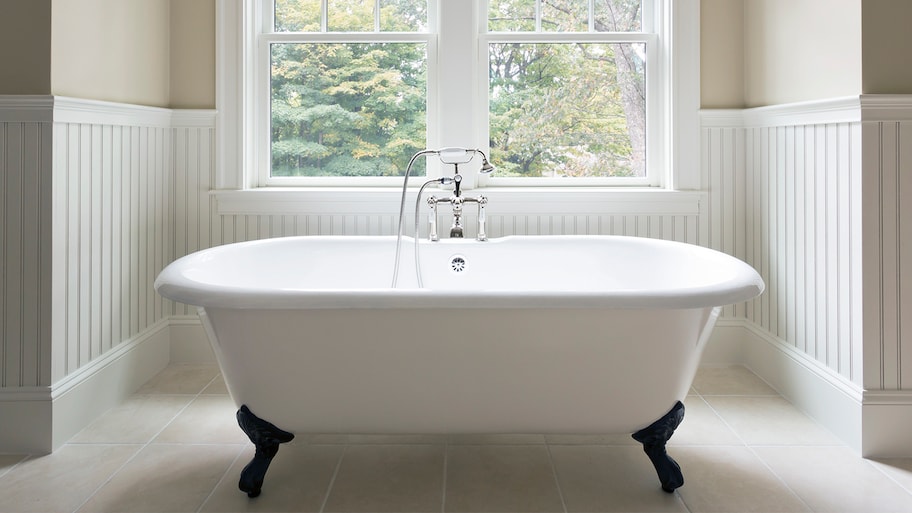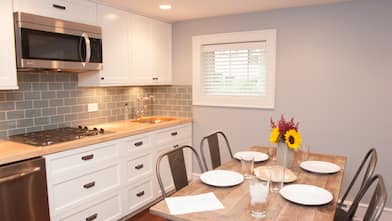Splish splash, a shower or a bath?
Some people love showers for the ability to get clean and get out the door quickly, to say nothing of their water-saving properties. Others prefer the relaxation of a hot bath after a long day and believe in taking time to smell the roses (or rose-scented bath soaps).
Choosing whether to install a shower or tub for your bathroom is an important decision that goes beyond ROI: it’s an appliance that you and your family will use every day, so it should meet your particular, practical needs. Consider our breakdown of all the pros and cons of tubs versus showers before you commit to that marble whirlpool model.
Shower Pros and Cons

It’s important to take a look at each option individually when weighing the best choice for your bathroom. Here are some pros and cons of showers:
Pros:
Uses less water
Takes up less floor space
Uses less energy from the water heater
Allows for a more luxurious, spa-like shower, with features such as extra showerheads or more elaborate options such as rain-style or steam, built-in seating, and door-less designs, which require less cleaning and maintenance
Variety of materials to choose from, like fiberglass and natural stone
Cons:
Shower doors require regular cleaning to prevent mineral build-up, and curtains often need replacing
Difficult to bathe children and pets
Harder to fix leaks
Creates higher humidity in your bathroom, which could be problematic if you have poor ventilation
Tub Pros and Cons

If you love the look of a clawfoot bathtub, consider all the pros and cons before making your final decision.
Pros:
Excellent for relaxation
Useful for bathing small children, pets, or hand-washing delicate clothing items
Classic aesthetics, with many design options (size, material, style) such as clawfoot, freestanding, soaking, and walk-in
Freestanding units can be placed nearly anywhere in your bathroom
Many add-on features such as jets or whirlpools
Cons:
Without a walk-in version, it might not be accessible
Uses more floor space than a shower
Uses more water
Requires a water heater with enough capacity to fill a bathtub
What About a Bath/Shower Combination?
You’re likely familiar with the bath and shower combination, a space-saver that provides the best of both worlds. On average, shower/tub combos cost anywhere between $300 and $2,000, depending on style, extra features, and size. Keep in mind that a combination shower/tub offers fewer design options (and sizes) than separate fixtures, so if you’re aiming for a particular look, you’ll want to purchase your shower and bath separately.
Should You Have a Bath or Shower in the Bathroom?
Here are a few key considerations when deciding whether to have a bath or shower in your bathroom. Ultimately, though, the decision will depend on your priorities and specific needs.
Price
Overall, tubs are less expensive, ranging from $400 to $8,000 installed, while showers cost $450 to $10,000. On the higher end of the spectrum, you’ll find whirlpool tubs and walk-in showers.
More affordable: Tubs
Size
A standard-sized tub will take up more space in your bathroom than a standard shower will, at 13 square feet versus 9 square feet, respectively. If you have a petite bathroom, replacing your tub with a shower could allow more storage or a larger, higher-end shower.
Best space saver: Showers
Resale Value
If you only have one bathroom, it’s wise to stick with a tub, as that can be appealing to many buyers. That said, you should consider your target resale market; if you live in a condo or apartment in a denser neighborhood with younger residents, having a shower instead of a bathtub probably won’t make or break the deal. But if you live in a suburban area with lots of families, a bathtub could be a much bigger issue.
Best ROI: Tie; depends on your neighborhood’s demographics and your home’s blueprint
Accessibility and Comfort
If accessibility is a concern, a shower is likely the best choice, with the addition of a bench, grab bars, and non-slip tiles. You can also consider the cost of an accessible tub, depending on the needs of those in your home.
Many also enjoy having the option to use a bathtub for relaxing soaks after a tough workout or a long day at work, so if this is a factor, the cost can be worth it.
Most comfortable: Baths
Water Use
On average, showers under 12 minutes only use about 2.1 gallons of water per minute, for a total of roughly 21 gallons per 10-minute shower. Compare this to the amount used for a standard bathtub, which requires 25 to 40 gallons or 80 to 100 gallons in a whirlpool. If you’re concerned about saving water (and energy required by your water heater to produce large amounts of hot water), a shower is a better option.
Most environmentally friendly: Showers





